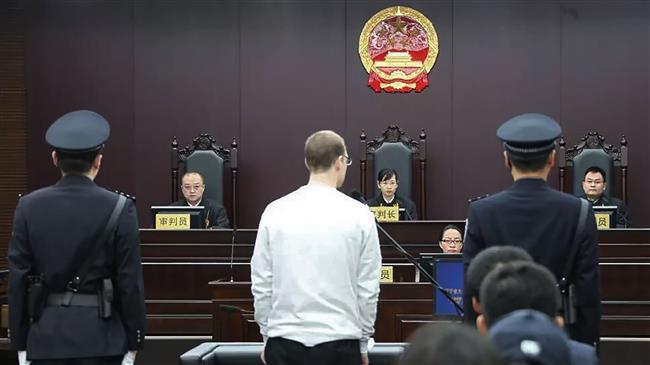 |
| Canada reacts to Chinese death sentence to citizen |
Canadian Prime Minister Justin Trudeau has accused China of acting “arbitrarily” in handing down a death sentence to a Canadian citizen over drug smuggling.
Canadian national Robert Lloyd Schellenberg, 36, had been detained back in 2014 — long before a diplomatic dispute broke out between Canada and China over the arrest in December 2018 of an official with the Chinese telecommunications giant Huawei on United States-filed charges.
Schellenberg had originally received a 15-year sentence and had appealed. On Monday, a court in northeast China’s Dalian found the earlier sentence to have been too lenient and sentenced him to death.
In reaction to the ruling, Trudeau expressed “extreme concern,” accusing Beijing of acting “arbitrarily.”
“It is of extreme concern to us as a government, as it should be to all our international friends and allies, that China has chosen to begin to arbitrarily apply (the) death penalty… as in this case,” he told reporters in Ottawa on Monday.
China has strict rules regarding narcotics crimes. Anyone found with more than 50 grams of a controlled substance can face the death penalty.
Meanwhile, the Canadian government updated its travel warning on Tuesday, calling on its citizens to “exercise a high degree of caution in China due to the risk of arbitrary enforcement of local laws.”
The development is expected to deteriorate already tense relations between Beijing and Ottawa, weeks after the arrest of the chief financial officer of Huawei, Meng Wanzhou, in Vancouver over charges filed by the US.
Two other Canadian nationals — former diplomat Michael Kovrig and business consultant Michael Spavor — have since been arrested in China over national security issues.
Last week, Trudeau accused Beijing of “arbitrarily and unfairly” detaining Kovrig and Spavor.
The Chinese Foreign Ministry reacted by saying that Kovrig, who now works for the International Crisis Group, still enjoyed diplomatic immunity.
Meng is currently free on bail, waiting for a hearing to decide about her possible extradition to the US, where she faces up to 30 years in prison over charges of bypassing unilateral sanctions on Iran.
Source:
Canadian national Robert Lloyd Schellenberg, 36, had been detained back in 2014 — long before a diplomatic dispute broke out between Canada and China over the arrest in December 2018 of an official with the Chinese telecommunications giant Huawei on United States-filed charges.
Schellenberg had originally received a 15-year sentence and had appealed. On Monday, a court in northeast China’s Dalian found the earlier sentence to have been too lenient and sentenced him to death.
In reaction to the ruling, Trudeau expressed “extreme concern,” accusing Beijing of acting “arbitrarily.”
“It is of extreme concern to us as a government, as it should be to all our international friends and allies, that China has chosen to begin to arbitrarily apply (the) death penalty… as in this case,” he told reporters in Ottawa on Monday.
China has strict rules regarding narcotics crimes. Anyone found with more than 50 grams of a controlled substance can face the death penalty.
Meanwhile, the Canadian government updated its travel warning on Tuesday, calling on its citizens to “exercise a high degree of caution in China due to the risk of arbitrary enforcement of local laws.”
The development is expected to deteriorate already tense relations between Beijing and Ottawa, weeks after the arrest of the chief financial officer of Huawei, Meng Wanzhou, in Vancouver over charges filed by the US.
Two other Canadian nationals — former diplomat Michael Kovrig and business consultant Michael Spavor — have since been arrested in China over national security issues.
Last week, Trudeau accused Beijing of “arbitrarily and unfairly” detaining Kovrig and Spavor.
The Chinese Foreign Ministry reacted by saying that Kovrig, who now works for the International Crisis Group, still enjoyed diplomatic immunity.
Meng is currently free on bail, waiting for a hearing to decide about her possible extradition to the US, where she faces up to 30 years in prison over charges of bypassing unilateral sanctions on Iran.
Source:
In this article:
